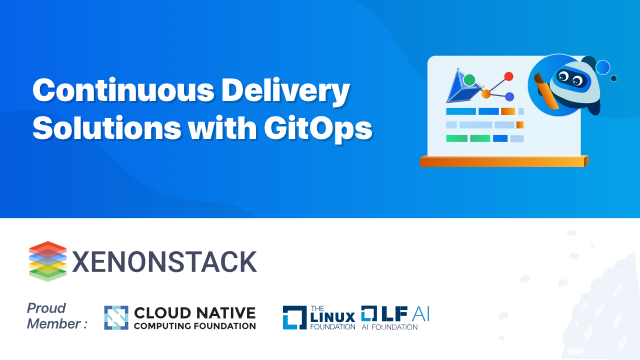
Introduction to GitOps
GitOps uses the Git repository as the sole source of credentials to provide the infrastructure as code. The submitted code verifies the CI process, while the CD process verifies and enforces requirements like security and infrastructure as code defined for the application framework. All code changes are tracked, making updates easy and providing version control if rollback is required.
GitOps provides:
-
Standard Workflow for App Development
-
Enhanced security for predefined application requirements
-
Improved reliability with visibility and version control via Git
-
Consistency across any cluster, any cloud, and any on-premises environment
How is GitOps different from DevOps?
GitOps and DevOps share some of the same principles and goals. DevOps is about cultural change and provides a way for development and operations teams to collaborate and work together. GitOps gives you the tools and frameworks to take DevOps approaches, such as collaboration, CI/CD, and version control, and apply them to infrastructure and deployment automation applications for Progressive delivery. Developers can work in code that they already know, while operations can put the other necessary pieces into place.
The Challenges with GitOps Deployments
Following are the challenges faced by enterprises while deploying GitOps
Scale Management for Enterprise GitOps
It's really easy to deploy the GitOps tool in a single cluster and start making changes with a small team. Its ease of application is one of the reasons why it is so popular. The very difficult case is trying to deploy the GitOps approach at scale on hundreds of clusters and thousands of developers. Implementing GitOps at scale is not easy, and most GitOps tools exist in a "wonder world" where everything resides in a container running in Kubernetes. In the enterprise, GitOps needs to be able to co-exist with services outside of Kubernetes and scale across various platforms.
Enforce Governance to Enterprise GitOps
Governance is difficult to manage with automation tools. Once you have the ability to replicate changes on a large scale, great power comes with great responsibility. Unfortunately, there aren't many built-in administrative capabilities in most local GitOps implementations or open-source solutions. It is important to ensure that no new security holes are introduced with a change caused by GitOps and that any company considering adopting a GitOps approach should consider policy-based governance. Enterprise-grade GitOps can't ignore change management and security.
Lack of Trust in Enterprise GitOps
Its difficult to ensure the change will not negatively impact customers, and that requires the need to continuously verification to validate deployment health using AI/ML automatically. Lack of trust is why releases are delayed and teams work late into the night and on weekends to release. GitOps is a great new paradigm, but it doesn't solve the fundamental problem of trust that brings so much work into the lives of DevOps engineers.
Xenonstack's Holistic Approach to GitOps Implementation
GitOps deployment has an operational continuity that helps to deploy and manage Kubernetes clusters and applications in any environment. A single management console lets you run teams that run anywhere, in the public cloud, at the edge, or in any hybrid scenario. A powerful multi-tenant architecture can accelerate application delivery by providing developers with self-service isolated workload namespaces across environments. Our GitOps solutions make it easy to monitor cluster health with built-in visibility and monitoring. At the same time, immutable infrastructure and configuration stored in git can be replicated securely and at scale across any team.
Xenonstack GitOps Solutions for Enterprises
- Greater visibility on the lifecycle of the developed feature
- Faster recovery from outages and unplanned downtime
- Increased developer productivity and an enhanced experience for teams
- Faster time to ship features in production
- Minimize failed deployments
Conclusion
GitOps enables enterprises to keep things working for cloud-native apps on Kubernetes. Configuration as code and infrastructure as code are trending concepts that have been around for quite some time, and GitOps, which came out much later, is an excellent fit for these new concepts.
- Click here to learn more about CI/CD Consulting for DevOps Automation
- Explore how to set up a Progressive Delivery vs Continuous Delive
- Explore more about GitOps Consulting Services for progressive delivery
.webp?width=1921&height=622&name=usecase-banner%20(1).webp)



